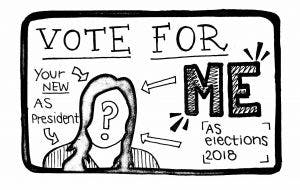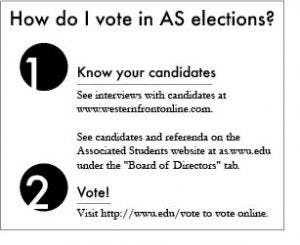Opinions of the editorial board
Many things happen when the sun finally comes out in spring quarter: people are slacklining, identical hammocks are being strung between trees all over campus and suddenly AS elections posters spring up on wall after wall overnight. Spring is here, and so are AS elections. Unsurprisingly, student voter turnout for AS elections is usually abysmal. In 2016, only 15.5 percent of students voted – just over 2,000 of the 14,000 students enrolled in spring that year.
Because of the AS position titles and the way student government works can be hazy, it might not be immediately clear how elections will affect students. From controlling millions of dollars in funding for student life to being the voice of the student body, board members have a great deal of power and what they do directly impacts students.

Board members serve as the liaison between the student body and university administration. Voting for a candidate that represents your views ensures your voice will be heard by the administration.
Last year, four of the AS Board candidates elected ran on campaigns focusing on representing students from marginalized communities. Their actions as elected officials reflect those values.
At a ceremony celebrating the start of construction on the Multicultural Center Friday, April 20, AS President Simrun Chhabra was among 75 demonstrators, many of whom were there representing one of the 17 clubs in the Ethnic Student Center. The students were not protesting the ceremony, but were there to represent the work students of color have put in since 2005 that led to the center’s construction.
The demonstrators worried the Multicultural Center would be used to make the university look more diverse and would be the stopping point for making campus more inclusive. Chhabra and other AS Board members were elected to represent students to the administration, and that’s exactly what they did.
Voting for candidates is a way for students to show the administration what they care about. Electing AS VP for Governmental Affairs Ana Ramirez, who is undocumented, showed the campus community supports undocumented students and told the administration they should too.
Electing AS Board members doesn’t just affect campus policies and issues. The board also represents student interests at the state and federal level, which determines funding for the university.
The AS Vice President for Governmental Affairs oversees the creation of legislative agendas for student lobby days in Olympia and Washington, D.C. This year, students urged state lawmakers to support funding for the State Need Grant and undocumented students. Later this quarter, Western students will go to Washington, D.C. to push for some of the same issues.
The board also handles millions of dollars. The AS Vice President for Business and Operations drafts the AS budget each year with the AS Budget Committee, which is then approved by the board. The 2018 budget allocated nearly $3 million to different groups, events and funds on campus, including Earth Day events, KUGS radio station and the Queer Resource Center.

If students are not interested in voting for board members, other important items are often included on the ballot: referendums. Students have voted on everything from renewing the transportation fee that provides them with bus passes, to building the Multicultural Center currently under construction – and if we should be charged a fee to help fund it.
This election, students will vote on whether or not campus should become smoke-free and if the AS should support strengthening ethnic studies on campus and including ethnic studies courses in GURs.
When voting in general elections for senators or presidents, it’s easy to feel like your voice is lost on the journey from ballot to legislation. Voting for AS board members will have an effect on campus as soon as next fall. The things they work towards will affect students directly.
While AS elections may seem reminiscent of voting for your high school student body president, the stakes are much higher. Students pay a lot to attend Western and they deserve to have representation in student government, especially when AS board members are responsible for so many aspects of campus life.
Click hereThe Western Front Editorial Board is composed of Taylor Nichols, Kira Erickson and Eric Trent.





